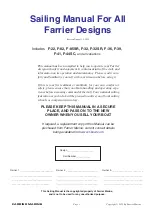
Fire
Be aware of and avoid conditions that lead to accidental fire. Guard against and watch for fuel
spills and leaks. Inspect wiring for damage or exposure that could lead to short circuits or
arcing. Make sure those who smoke are vigilant. Smoking is an ignition source that can start a
fire. Don't allow smoking while fueling. Keep an USCG approved fire extinguisher aboard at
all times. Inspect the fire extinguisher regularly. Learn how to properly use it and instruct other
to use it. Use water to fight fire as a last resort and then only after making arrangements to
abandon the boat if a fire should get out of control. If a fire is burning out of control and you
must abandon the boat keep the following in mind:
Abandon the boat into the wind to minimize burn risk from floating fuel.
Wear a PFD unless you must swim under burning fuel.
If swimming under burning fuel throw a PFD outside of the burning area and
swim under the burning fuel to it.
Flooding
Be aware of the conditions that can cause your boat to flood with water and avoid them.
Possible causes of flooding include damage to hull or thru-hull fitting, waves washing into the
boat, and water-entering cockpit due to improper loading. If you allow water to enter the boat
faster than the bilge pump can expel it, the boat will become flooded and may capsize or sink.









































